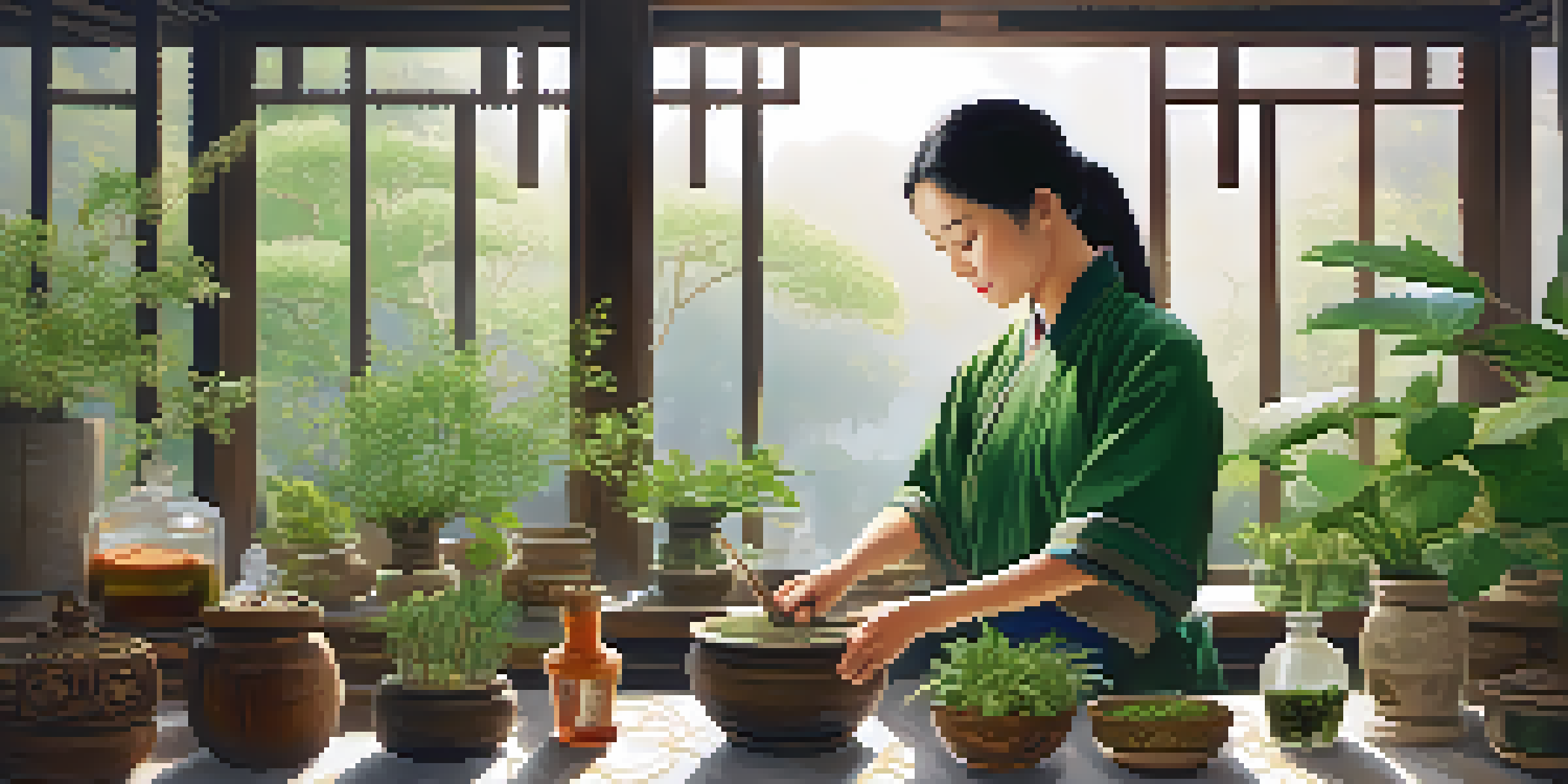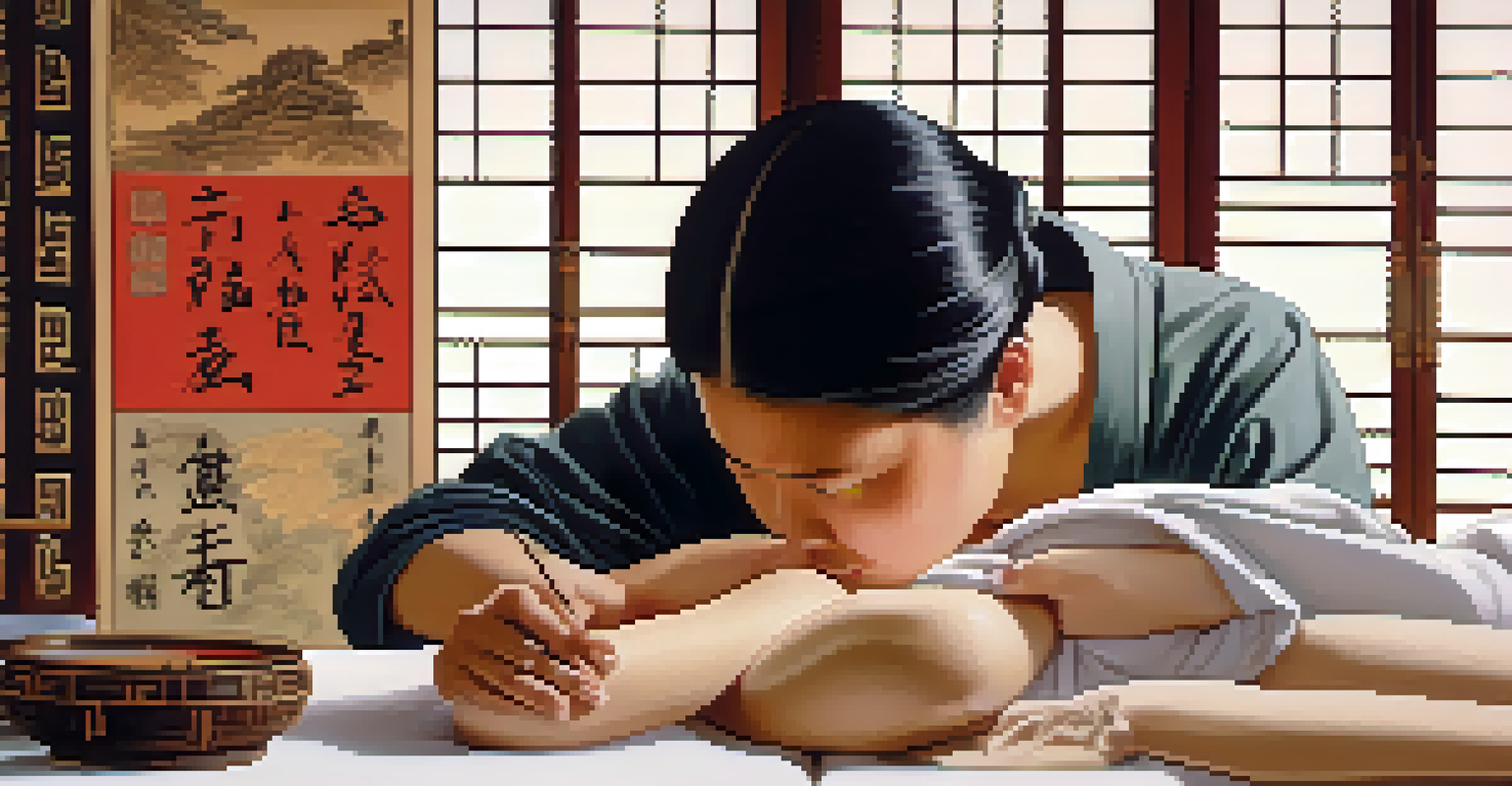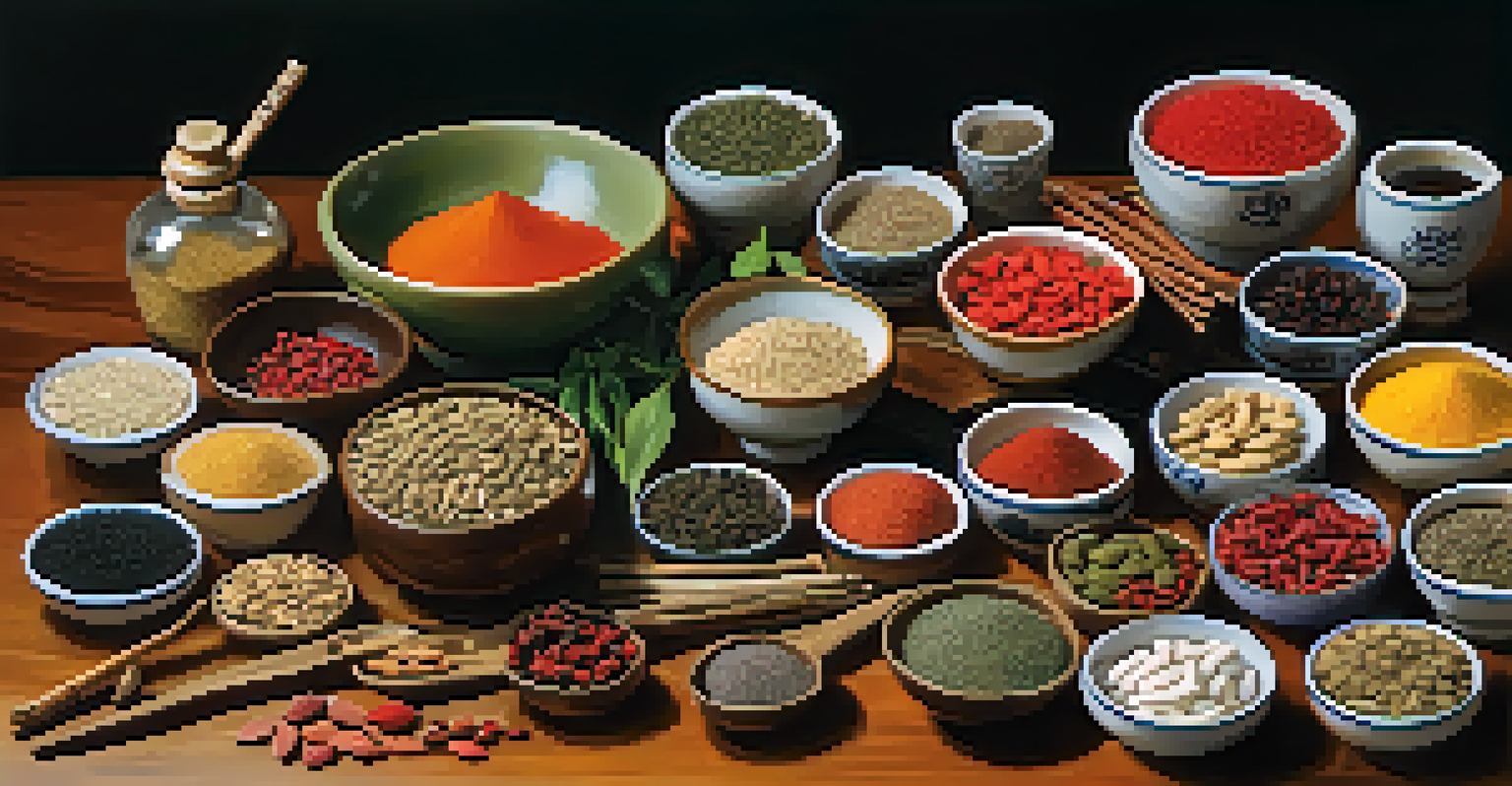Integrating Traditional Chinese Medicine into Modern Health

Understanding Traditional Chinese Medicine: A Brief Overview
Traditional Chinese Medicine (TCM) is an ancient healing system that has been practiced for over 2,000 years. It focuses on balancing the body's vital energy, known as 'Qi' (pronounced 'chee'), which is believed to flow through channels in the body. TCM includes various modalities such as acupuncture, herbal medicine, and dietary therapy, each contributing to overall wellness.
The greatest medicine of all is to teach people how not to need it.
At its core, TCM emphasizes a holistic approach, treating the person rather than just the symptoms. For example, a headache may not just be treated with pain relief but also by addressing underlying imbalances in the body. This perspective can be refreshing and offers a comprehensive understanding of health that resonates with many seeking alternative remedies.
Understanding TCM is essential for integrating it into modern health practices. It encourages individuals to explore their health through a lens that combines physical, emotional, and environmental factors, making it a valuable complement to contemporary medicine.
The Science Behind TCM: Bridging Tradition and Modern Research
In recent years, the interest in TCM has surged, prompting scientific studies to validate its principles and practices. Research has shown promising results in areas like pain management, stress relief, and digestive health. For instance, acupuncture has gained recognition for its effectiveness in alleviating chronic pain, supported by numerous clinical trials.

Moreover, herbal remedies used in TCM are being examined for their potential benefits. Ingredients like ginseng and ginger have shown to possess anti-inflammatory and antioxidant properties, which modern science is beginning to embrace. This blend of ancient wisdom and modern research helps demystify TCM for a wider audience.
Holistic Health Through TCM
Traditional Chinese Medicine emphasizes treating the whole person by addressing the root causes of health issues, not just symptoms.
By bridging the gap between TCM and contemporary scientific evidence, practitioners can offer a more integrative approach to health care. Patients are increasingly looking for treatments that encompass both traditional and modern methodologies, enhancing their overall health experience.
Integrating TCM with Western Medicine: A Collaborative Approach
The integration of TCM and Western medicine is not about choosing one over the other; it's about finding a balance that works for the individual. Many healthcare professionals are beginning to recognize the value of complementary therapies, incorporating TCM practices into their treatment plans. This collaborative approach can enhance patient outcomes and satisfaction.
To keep the body in good health is a duty… otherwise we shall not be able to keep our mind strong and clear.
For instance, a patient undergoing chemotherapy may benefit from acupuncture to combat nausea and fatigue. By addressing side effects holistically, TCM can improve the patient's quality of life during treatment. This synergy highlights the importance of open communication between different healthcare providers.
As more patients seek integrative options, the healthcare landscape is evolving. Both TCM and Western medicine can coexist, offering individuals a broader spectrum of care that caters to their unique needs.
The Role of Diet in Traditional Chinese Medicine
Diet plays a crucial role in TCM, where food is viewed as a form of medicine. According to TCM principles, different foods can influence the body's balance of Qi, Yin, and Yang. For example, warming foods like ginger and garlic may be recommended during colder months to boost energy and immune function.
Incorporating TCM dietary practices encourages mindfulness around food choices, promoting seasonal and locally sourced ingredients. This approach not only aligns with TCM's philosophy but also supports sustainable eating habits. By understanding the energetic properties of food, individuals can make informed decisions that support their health.
Integrating TCM with Western Medicine
The collaborative approach of combining TCM and Western medicine enhances patient care and satisfaction by offering a broader spectrum of treatment options.
The emphasis on diet in TCM provides an opportunity for individuals to take charge of their wellness. By adopting these dietary principles, one can experience a more harmonious lifestyle that aligns with both TCM and modern nutritional understanding.
Acupuncture: A TCM Technique Gaining Popularity
Acupuncture is perhaps the most well-known aspect of TCM in the West. This technique involves inserting thin needles into specific points on the body to stimulate energy flow and promote healing. Many people report experiencing relief from various ailments, such as migraines and chronic pain, after acupuncture sessions.
Research supports acupuncture's effectiveness, leading to its growing acceptance in conventional medical settings. Hospitals and clinics are increasingly offering acupuncture as part of their pain management and rehabilitation programs. This shift shows a commitment to providing holistic care that considers multiple healing modalities.
As more people embrace acupuncture, it fosters a greater appreciation for TCM's rich heritage. This renewed interest encourages individuals to explore how TCM techniques, such as acupuncture, can enhance their overall health and well-being.
Herbal Medicine: Nature’s Pharmacy in TCM
Herbal medicine is another key component of TCM, utilizing plant-based remedies to support health and treat illness. TCM practitioners often create customized herbal formulas tailored to the individual's specific needs. This personalized approach can address multiple symptoms concurrently, unlike some conventional medications that target a single issue.
Many common herbs used in TCM, like licorice and goji berries, have gained popularity in modern wellness circles. As people become more aware of the benefits of natural remedies, herbal medicine is making its way into mainstream health practices. This trend reflects a growing desire for more holistic and less invasive treatment options.
Mindfulness in TCM Practices
Mindfulness and meditation are central to TCM, promoting mental well-being and helping individuals achieve a balanced and fulfilling life.
Integrating herbal medicine into modern health practices requires careful consideration and guidance from trained practitioners. By doing so, individuals can safely explore the benefits of TCM while minimizing potential risks associated with self-medication.
Mindfulness and Meditation: TCM's Path to Mental Well-Being
Mindfulness and meditation are integral to TCM, promoting mental and emotional balance. Practices such as Tai Chi and Qigong combine gentle movement with breath control, helping individuals connect with their bodies and reduce stress. These activities not only enhance physical health but also cultivate a sense of inner peace and clarity.
In today's fast-paced world, the importance of mental well-being cannot be overstated. Integrating mindfulness practices from TCM into daily routines can offer significant benefits, including improved focus, reduced anxiety, and enhanced emotional resilience. Simple techniques like deep breathing or guided meditation can be easily incorporated into anyone's life.

By embracing mindfulness and meditation, individuals can foster a holistic approach to health that nurtures both the body and mind. This integration of TCM principles into modern lifestyles encourages a more balanced and fulfilling existence.